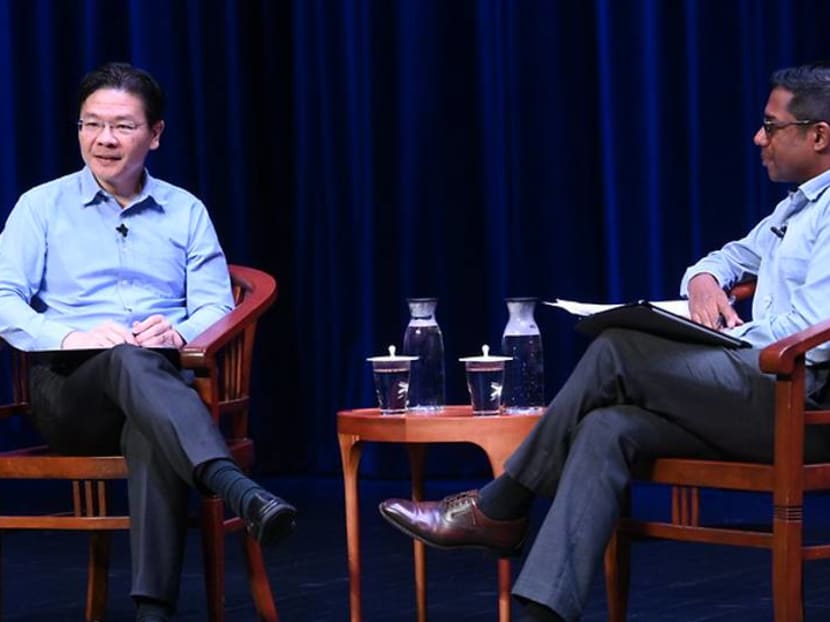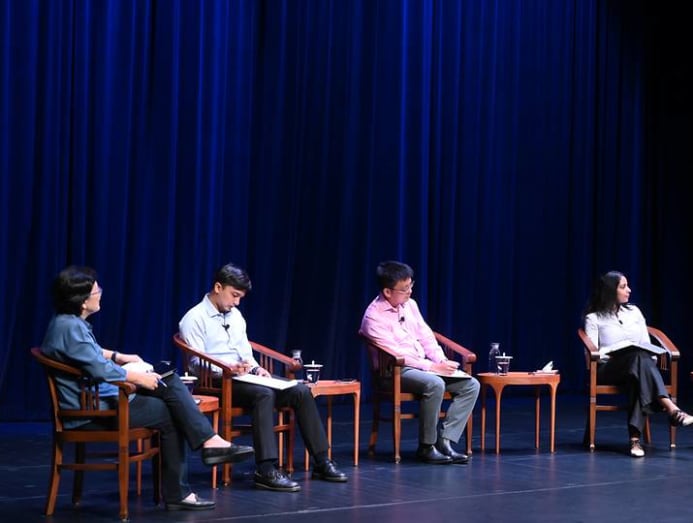Singapore right to be concerned about racist incidents as there is 'always a risk' of regression on race issues: Lawrence Wong

Finance Minister Lawrence Wong (left) at the IPS-RSIS Forum on Race and Racism in Singapore on Jun 25, 2021. (Photo: Institute of Policy Studies)
SINGAPORE: Singapore should be “very concerned” about racist incidents because there is "always a risk we will regress and move backwards" on race issues, said Minister for Finance Lawrence Wong on Friday (Jun 25).
In a dialogue moderated by Dr Shashi Jayakumar of the S Rajaratnam School of International Studies (RSIS), Mr Wong answered a question on whether Singapore is moving in “the right direction” on race issues.
He said while Singapore has "come a long way" from 20 to 30 years ago, racism still exists in the country.
“Indeed, the recent spate of incidents are a concern,” said Mr Wong. “We should rightfully be very concerned about this because we cannot assume that progress will always move in one direction. There is always a risk that we will regress and we will move backwards.”
His comments come after a series of incidents sparked public debate about race. Earlier in June, a viral video emerged showing a Ngee Ann Polytechnic (NP) lecturer making racist remarks towards an interracial couple.
In another incident last month, a 55-year-old Indian woman was allegedly kicked and subjected to racial slurs by a man while she was brisk walking.
Friday's dialogue was held at a forum on race and racism in Singapore, organised jointly by the Institute of Policy Studies (IPS) and RSIS.
READ: 'Take the extra step' to make minorities feel comfortable, says Lawrence Wong in speech discussing racism in Singapore
A MINORITY PRIME MINISTER
Mr Wong was also asked why a person from a minority race cannot be prime minister.
“Doesn’t this run against the grain of meritocracy as we understand it?” said Dr Jayakumar.
Anyone who wants to be prime minister will have to connect with voters, mobilise Singaporeans and lead the party to win elections, said Mr Wong.
“This applies to anyone regardless of race,” he added.
Citing surveys conducted by IPS, Mr Wong noted that a “significant proportion” of Singaporeans are “more comfortable” with a prime minister of their own race.
“This cuts across Singaporeans across different ethnic groups … I wish it were not so, but the survey results are as they are,” he said.
“So a minority who wants to be prime minister should be aware of these attitudes. It doesn't mean that he or, for that matter, she, can't be a prime minister, but these are the realities on the ground.
“I should also say it doesn't mean that we should just accept these attitudes as they are and say fine, so be it. We shouldn't accept these attitudes, we should instead work very hard to change them. And I certainly will look forward to the day when Singapore has a minority prime minister, I would welcome that.”
LIANHE ZAOBAO EDITORIAL
Mr Wong was also asked for his comments on the recent editorial published by Lianhe Zaobao that linked recent racist incidents to various causes, including the COVID-19 pandemic, social media and “concepts from the West” like critical race theory.
The editorial was published on Jun 9. Shortly after, an open letter by academics and scholars detailed concerns about how Zaobao had characterised the problem of racism here following recent racist incidents. It was signed by more than 200 local academics and scholars.
Adding that he read the editorial “carefully”, Mr Wong said the piece made a stand "explicitly" that they rejected racism and that they found these incidents unacceptable.
“There was no doubt about that. They offered some explanations about why these incidents could have happened,” he added.
“I don’t think they intended for these explanations to be comprehensive, or that these explanations would obviate the need for us to do more.”
To address racism “at its root”, people must “all work together”, Mr Wong added.
“It requires us to look at things carefully, based on our context, our circumstances, our realities, understand what the issues are, and then see what areas can be improved. It could be policy, it could be behaviours, it could be institutions, but whatever they are, look at constantly improving and getting better.
“I think that must be the imperative, and I'm sure that was the objective and intention of the Zaobao editorial.”
READ: The Big Read: High time to talk about racism, but Singapore society ill-equipped after decades of treating it as taboo
HDB ETHNIC INTEGRATION POLICY
The dialogue also addressed the ethnic integration policy in Housing Board (HDB) flats. Dr Jayakumar mentioned the policy where a home owner of a minority race can only sell his flat to another member of a minority race, once the quota for the majority race has been reached.
"This disadvantages minorities, that's the perception, (it) may well be a reality,” said Dr Jayakumar, asking Mr Wong to share his thoughts on the issue.
“We apply it consistently to all ethnic groups, and we try very hard to achieve a balanced mix of ethnic groups in our housing estates," said Mr Wong, who used to be the National Development Minister.
“It's not just about the numbers, but the fact that by doing so, over the years we have achieved a social mixing and integration in our housing estates where people of all races can interact with one another more freely.
“And importantly, our children grow up together, they play together, they attend the same schools in the neighbourhood together. That helps to build that sense of attachment, belonging and identity as Singaporeans.”
Adding that this is the outcome of Singapore’s ethnic integration policy, Mr Wong said people should "appreciate that", and that there was "tremendous value" to it.
“What would happen without EIP (Ethnic Integration Policy)? I have no doubt that we will end up with ethnic enclaves in many of our housing estates," he added.
Noting that this can be seen in cities like Paris, New York and London, he said there will be "segregation by race" and that minorities will be "squeezed out".
"They will not have the opportunities to buy flats in mature estates where prices are more expensive. Will we be better off? I don't think so. I don't think so, that discarding the EIP will make Singapore better.”
Mr Wong acknowledged that there are minority owners who face difficulties selling their flats due to limits from the ethnic integration policy, and said such cases can appeal to HDB or the Ministry of National Development (MND).
“We will deal with them on a case by case basis, extending a full range of flexibilities to help accommodate the request and make it easier, give them more time to sell, or even waive the EIP limits in exceptional circumstances," said the minister.
Adding that MND continues to study the issue, Mr Wong said people should recognise the value of the ethnic integration policy and work to "improve it, fine tune it, make it better", rather than discarding it.
CMIO MODEL
The dialogue also addressed the Chinese-Malay-Indian-Others (CMIO) model. The model “does help” by providing a framework for social policy, said Dr Jayakumar.
“But how do we prevent the conflation of the CMIO framework from that necessary policy tool versus the multicultural goals of Singapore?” he asked.
Sometimes, people make the assumption that policies that take race into account will detract from multiracialism, said Mr Wong.
“CMIO is often cited as one example - you make me more conscious of my ethnic identity, and therefore this detracts from what we are trying to achieve, which is a multiracial ideal.”
Adding that he appreciates this view, he said: “Consider this, if we were to discard CMIO, does it mean that people will start forgetting about their ethnic identities or paying less attention to their ethnic identities?
“If we were to ignore racial differences, does that mean that the differences do not exist? In fact, I would say our policies that take into account race, whether it's CMIO, whether it's ethnic integration policies, have helped to strengthen our racial harmony. In some ways, in many ways, they have helped to make us less race-conscious.”
But these policies are “not set in stone” and the Government continues to review them, said Mr Wong, noting that there were some changes made to the CMIO model a few years ago.
READ: Racism exists but Singapore has made 'tremendous progress' in racial harmony: Shanmugam
RACIST BEHAVIOUR BY TEACHERS
There have also been firsthand accounts of racist behaviour by teachers and reports that the incidents are “quite often” not resolved, said Dr Jayakumar.
NP said earlier in June it was "proceeding" to terminate the service of a lecturer after a viral video of him making racist remarks towards an interracial couple. The staff member is also accused of making Islamophobic remarks in class in 2017, according to an online post by an NP alumna.
Dr Jayakumar asked how people should deal with the issue of teachers who "may or may not be overtly racist", and asked if there is a "better channel" for people to report such cases.
If the allegations are true, they should be reported to school leaders and to the Ministry of Education (MOE), and they will be followed up on, said Mr Wong, who was previously the Education Minister.
Noting that the ministry saw such instances during his time there, he added: “Let's look at the instance of … the particular behaviour, some instances are perhaps ambiguous or accidental. Perhaps a person had not realised it, because truth be told, we all have our blind spots and biases.
“And so perhaps the way to address these sorts of issues are by counselling the teacher, or by counselling the students, and we can move forward.”
Some incidents are “far more egregious”, and the person may have intention to discriminate according to his or her personal views, Mr Wong noted.
“(These views may) not be so clearly spelt out, or not so obvious to people before, but then it shows up one time in the classroom or in the school environment," added the minister.
“And if we see this and we know that this is happening, then obviously, we have to take a firm stance against that individual, whoever that person is.”
EDUCATION PEDAGOGIES ON DIVERSITY
Dr Jayakumar also asked if the Government would be open to adopting education pedagogies in schools, designed to promote understanding of diversity, anti-bias education and deeper understanding of multiculturalism, translating them for the Singapore context.
Noting reports about how pre-school children exhibit racial preferences, Mr Wong said it is a reminder that "this is part of human instinct to be more comfortable with our own".
“We should understand it exists. But should we find ways … as the educator asked, pedagogies that can help us open our mindset? Definitely we should,” said Mr Wong.
“And we should be open to thinking about what are the best ways in which we can engage and bring up children to appreciate that we are all equal, regardless of race, language or religion.”

The issue of whether and how anti-racism content can be introduced in schools was also raised in a panel discussion after the dialogue session by Mr Wong.
"I think schools are a great place to start ... Maybe we should think ... about training teachers in implicit bias training because people don't know that they might have biases, blind spots and how to spot them, how to guard against them," said Dr Laavanya Kathiravelu, Assistant Professor at the School of Social Sciences College of Humanities, Arts and Social Sciences at Nanyang Technological University.
"As a sociologist ... thinking how we can make changes not just in terms of our everyday behaviour, which we should, but also at the institutional level, which will also feed into the ways in which we think at the individual level."
Another panellist, sociologist Associate Professor Daniel Goh from the National University of Singapore, said that children can learn attitudes about race from a young age and it then "becomes instinct".
"That's where I think we need to intervene, in the schools, from a young age, maybe even at the pre-school level," he said.
The panel also included Associate Professor Elmie Nekmat from the NUS Department of Communications and New Media, and Mr Goh Sin Teck, editor of Chinese broadsheet Lianhe Zaobao.
CHINESE PRIVILEGE
Responding to a question about the Lianhe Zaobao editorial published on Jun 9, Mr Goh said that there are risks to both discussing race issues openly and sweeping them under the carpet, but on balance it would be better to start discussing them.
"I think we should start talking about this and when we start talking about this, it is inevitable that you have people from different school of thoughts, different opinions come out," he said.
People then have to learn not only to say what they want to say, but listen to others with different views, he added.
"And I thought the newspaper can provide such a platform," said Mr Goh.
The panel also discussed whether it was appropriate to borrow concepts from movements like Black Lives Matter or use terms like "Chinese privilege" in Singapore.
Dr Kathiravelu said that the notion of privilege has resonated with young people here because people are "struggling for a language (with which) to talk about social reality".
"These ideas or these concepts are useful to express particular feelings, particular social realities, but I think we should acknowledge that they imply a very different reality in Singapore but they might be useful still to acknowledge hierarchies, differences, inequalities."
Assoc Prof Goh said that Singapore, as a connected, globalised city, has "imported" many terms and made them part of our identity but the "key thing" was that they are adapted to Singapore's context.
"To use (privilege) as a blanket term ... it puts everyone into a defensive posture, it cuts conversations," he said.
"It's better to start off with experiences, whether it's in institutions or whether it's in everyday life: This is my experience of racism, of an incident of racism. Don't start pointing fingers at each other's skin colour and say 'this privilege, that privilege' ... Let's open up the space for conversations and for discussions."







